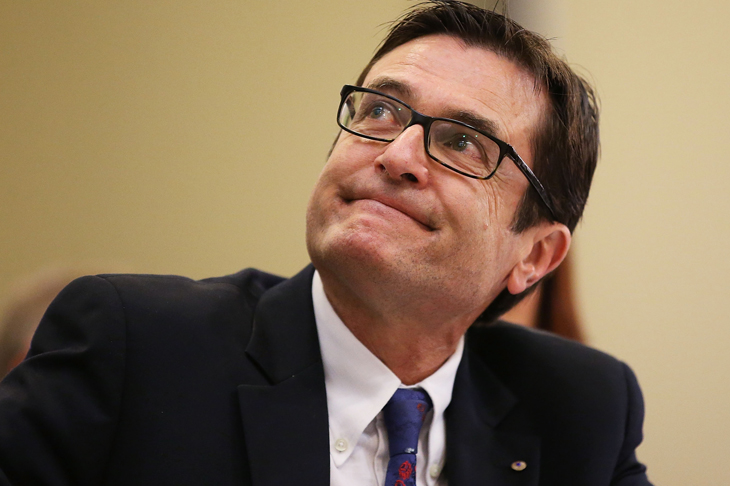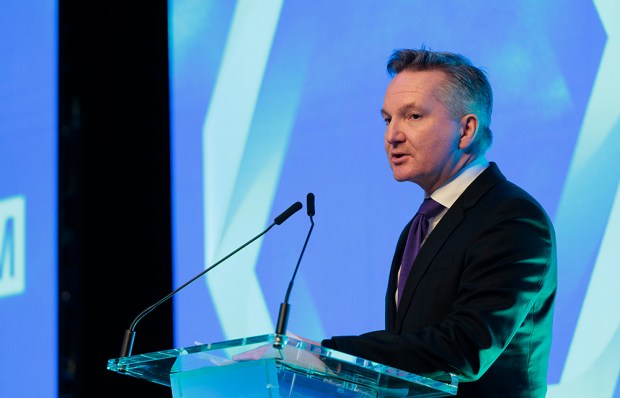Greg Combet: Labor’s cashed-up secret weapon
Get used to seeing Greg Combet’s face on TV; his new ‘personal’ superannuation ads mark the beginning of what promises to become Australia’s biggest-ever multi-million-dollar non-party anti-government political advertising campaign all the way to the 2022 federal election. Extolling the virtues of union-dominated Industry Superannuation Funds, the current Combet ads are just a warning manoeuvre while the government wrestles with its backbench about whether to cancel next July’s start to legislated rises in employers’ superannuation levy for workers from 9.5 to 12 per cent. The Combet campaign will turn really serious once Prime Minister Scott Morrison eventually bows to the inevitable and breaks last year’s (unnecessary?) election promise by dumping 12 per cent (if the Senate lets him) and so faces the certainty of a very large part of a $3 trillion superannuation industry having a bottomless pit of funds available ostensibly ‘to protect the interests of members’ (most of them non-unionists) by supporting Labor’s already expressed willingness to do what the unions want – and also remembering ‘deserving’ cross-bench senators.
None of this will be a surprise to the Morrison government; fear of the political consequences of dumping the economically ludicrous levy rise would have been the only rational excuse for having delayed doing so for so long in the face of overwhelming evidence. A year ago, under the heading ‘Industry supremo flags ad campaign if super rise thwarted’ the SMH reported Combet as chair of Industry Super Australia saying that industry funds were ‘looking into’ whether they should prepare an ad campaign in support of the rise in the super guarantee. And a couple of months ago Combet (now hailed in the Conversation as Australia’s most powerful man with the future of Australian capitalism in his hands) confirmed that Industry Super Australia was ‘embarking on an awareness campaign so Australians can get maximum value out of this extra super coming their way…under this settled government policy’. He added that ‘The ads will be seen on TVs, mobile phones and outdoor billboards for the next six months, to raise awareness among Australians of how valuable this super rate rise will be…with a 30-year-old worker on an average wage standing to gain more than $85,000 in extra super by the time they retire. As super system leaders it is our duty to tell our members about the positive impact this policy would have on their retirement.’ And it will no doubt be their ‘duty’ to demonstrate how the Morrison government seeks to rob retirees of their rightful retirement reward. Any hopes the government may have had that this clearly political spending could be blocked have gone; experience with Treasurer Josh Frydenberg’s April request for the corporate watchdog to keep a close eye on communication and advertising by superannuation funds on the emergency withdrawals arrangements brought little joy. ‘Advertising is not unlawful and is monitored by APRA…. Trustees are required by law to only spend money in members’ best interests and for the sole purpose of providing benefits to members when they retire.’
Morrison and Frydenberg have no option but to dump 12 per cent; widespread media reports that the government is considering abandoning the scheduled rise in compulsory superannuation contributions are an acknowledgement that an increase would depress take-home pay and undermine the recovery from the Covid-19-induced recession. Backbench stirrers like HofR Economics Committee chair Tim Wilson and his dozen or so colleagues now have impeccable and overwhelming support – the Reserve Bank, the Treasury, the Grattan Institute, the Productivity Commission, the Australian Council of Social Service, the Henry review and presumably the yet-to-be-released 650-page retirement income review report. Responding to pressing questions from Wilson at last week’s committee hearing, Reserve Bank chairman Philip Lowe spectacularly ignored his earlier reluctance ‘to offer an opinion on the merits of the politically controversial issue of lifting the superannuation guarantee’, by effectively removing any sound economic basis on which the government could proceed with the rise, warning that it would reduce take-home pay, cut spending and may ultimately cost jobs. ‘The evidence is that increases of this form do get offset by lower wage growth over time. If this increase goes ahead, I would expect wage growth to be even lower than it otherwise would be. There will be less current income and if there is less income there may be less spending and if there is less spending there may be less jobs.’
The Grattan Institute is even more strident on the negative economic consequences of 12 per cent. Grattan’s Brendan Coates said that existing compelling arguments against increasing compulsory super contributions underlined the bad timing of Covid-19 era increases over the next couple of years. ‘Raising super in the midst of a deep recession would only slow the pace of economic recovery…. Our work shows that around 80 per cent of the cost of super comes via lower wages within two to three years. The long-term impact could be as high as 100 per cent.’ So raising compulsory super to 12 per cent would not only strip up to $20 billion from workers’ wages each year but would also cost the federal budget close to $2 billion a year in extra super tax breaks, which would largely only benefit wealthier Australian workers. In any event, Rice Warner Actuaries have shown that 12 per cent would not move reliance on at least a part pension below the current 68 per cent but would add considerable costs to government through the extra tax breaks.
While dumping 12 per cent is right on the economics, how vulnerable would the government be on the politics? Can Labor and Combet make superannuation into a ‘Work Choices’ or ‘Medicare’ scare campaign? It’s stance is clear; it will restore 12 per cent, with leader Anthony Albanese accusing the Coalition of being intent on undermining the superannuation system and Tanya Plibersek saying that ‘Abandoning 12 per cent is trying to force more people to live in poverty and is more evidence of the Coalition looking to smash super’.
After Labor’s retirement incomes fiasco in last year’s election, and the Coalition’s dithering, how credible is either side in this battle?
Got something to add? Join the discussion and comment below.
Get 10 issues for just $10
Subscribe to The Spectator Australia today for the next 10 magazine issues, plus full online access, for just $10.
You might disagree with half of it, but you’ll enjoy reading all of it. Try your first month for free, then just $2 a week for the remainder of your first year.














Comments
Don't miss out
Join the conversation with other Spectator Australia readers. Subscribe to leave a comment.
SUBSCRIBEAlready a subscriber? Log in